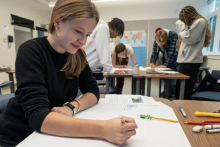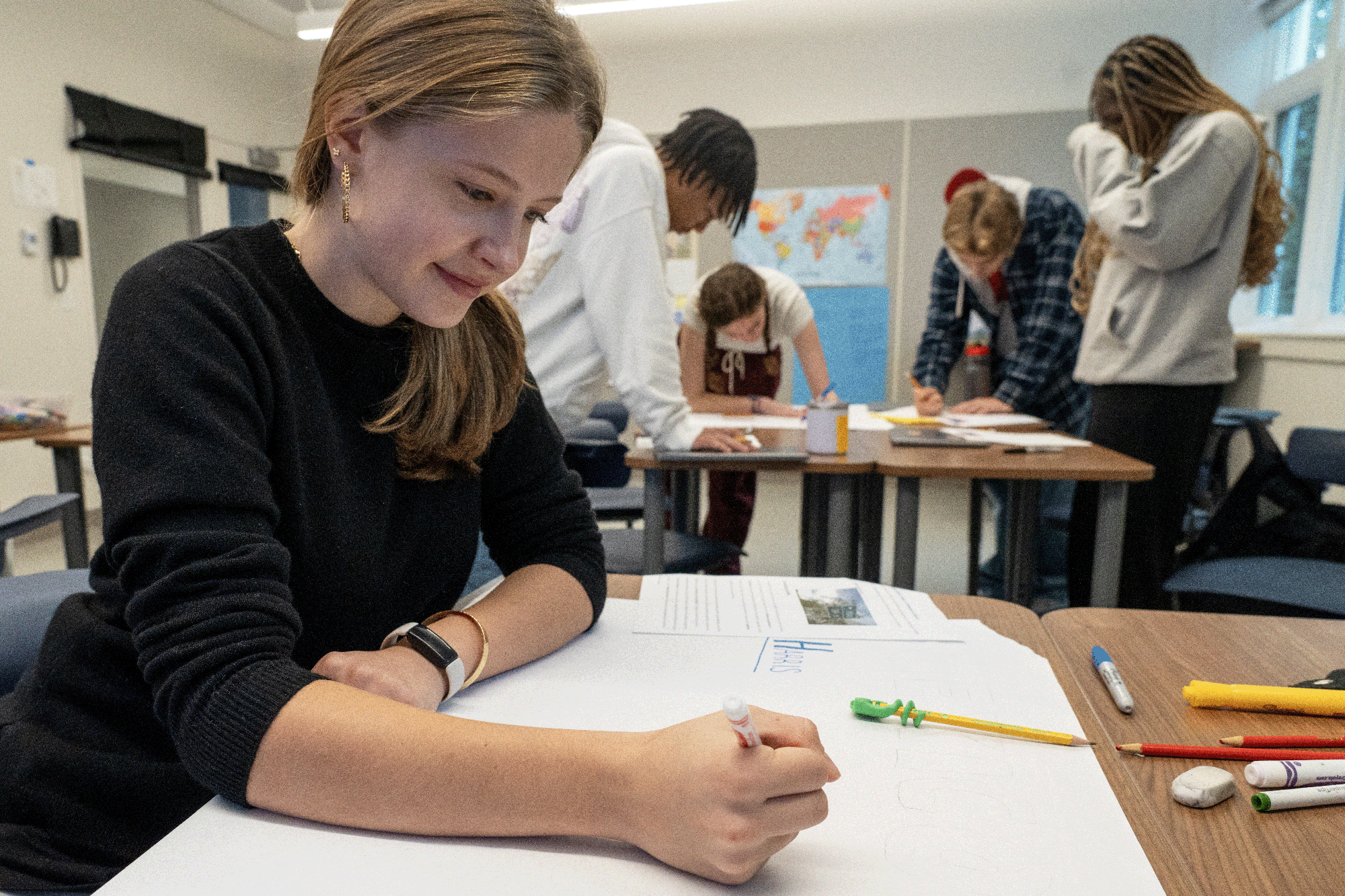
From our summer reading selections to a two-day election teach-in, Field faculty and students are in conversation about how to navigate potentially polarizing conversations. Upper School Director Page Stites shares the work we are doing to ensure teaching students how to think rather than what to think.
“When someone says ‘let’s agree to disagree’ I know it’s time to stop arguing to win and start asking questions to learn, and I’ll ask ‘Where did I lose you? Where did this conversation go off the rails? What could I have done differently?’”
This quote from organizational psychologist and Wharton School professor Adam Grant is one that really stands out to me from all of the reading and listening I’ve been doing about how we can best prepare ourselves and our school community for this year’s election season. I love it because Grant puts the responsibility for something going wrong in a conversation back onto himself, and it reframes a moment of disagreement as an opportunity to learn more and take the conversation to a deeper place instead of retreating from it.
In the current political and cultural climate in our country and around the world, one doesn’t have to look too far to find disagreement, grievance, and polarization. Many of our political leaders and public figures on both sides of the aisle give us plenty of examples every day. Social media feeds are filled with absolutism, snark, and vitriol - those platforms are hardly a place for nuance and deeper understanding.
At Field, we started talking and thinking about our responsibilities as an educational institution to address these challenges, beginning last spring, as we anticipated the November 2024 election. We heard from students that they were craving some structure and guidance, so we started with a series of norms for students and faculty around how to navigate potentially polarizing conversations and to ensure that we were focused on teaching students how to think rather than what to think. Those norms paved the way for us to start having conversations within our community about how we might approach this election season. To further prepare ourselves, we chose Try to Love the Questions by Lara Hope Schwartz as a summer reading book for faculty and our 11th and 12th grade students, and I Never Thought of it That Way by Mónica Guzmán for our 9th and 10th graders. We also introduced these texts to the students with an advisory lesson designed to give them practice disagreeing with each other in very low-stakes situations.
During our summer professional development meetings with faculty, we engaged in a series of conversations about how to have and facilitate difficult conversations, how to address our own fears and those that our students might bring to those conversations, and how to support the growth of active listening skills. We even practiced having conversations with each other about potentially contentious topics. In one debriefing conversation, a faculty member shared, “I was really nervous about sharing my true thoughts and feelings on this issue with my partner but I did it anyway. What I realize now is that even by spending 10 minutes together doing this he and I have a deeper connection with each other and that even if we disagree we know we can talk to each other about challenging things.” We workshopped and role-played, building trust and confidence in each other, and by the time the school year started we felt we were ready to dive into this work with our students.
Throughout this September, we introduced a series of lessons designed to prepare students for the “Election Teach-In” that we held on Monday and Tuesday. These lessons built on last year’s work, picked up on themes from the summer reading assignments, and continued to help students develop important skills for understanding each other and practicing active listening.
This work culminated this week with our Election Teach-In, in which students engaged in election- and politics-focused lessons across the curriculum in each of their classes. English 11 students read, analyzed, and discussed inaugural poems from multiple presidential administrations. Math students learned about different voting systems, how the Electoral College works, and how to understand and critically analyze polling data. Studio students explored protest music and political advertisements and posters. Science students discussed how to evaluate scientific evidence and considered the science behind important issues, from energy policy to the national discussion around IVF. Language students read and discussed newspaper stories about the American election from Spanish- and French-speaking countries around the world. History students learned more deeply about the origins of our political and electoral systems and researched and discussed the potential impacts on global challenges of the outcome of November’s election. Our 6th graders ran a mock election for the community on a number of issues, and our upper school students engaged in a panel discussion with representatives from non-partisan organizations working within our government to reduce polarization and increase cooperation among politicians with differing viewpoints.
We know that the upcoming election is just one moment in time and that we will have many months of this school year beyond November 5 to continue this work. We also know that if recent history is any guide the outcome of the election may not be clear on the morning of November 6. Rather than avoiding discussion of these issues, we’ve taken the challenge of meeting this moment seriously and have already helped our students develop skills that will help them understand and process whatever happens down the road. We are already planning for further lessons, conversations, workshops, and speakers to continue this work, and we feel confident that our proactive approach will benefit our students and our entire community as we navigate this complex and contentious political and cultural moment.
"I learned more about elections and listening to others' opinions. It made me realize that we need to accept where people are coming from even though we don't totally agree." ~Jade '27
